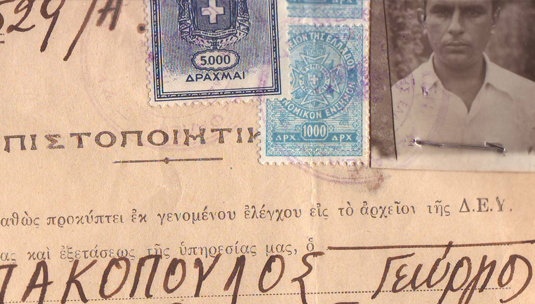SOCIAL BELIEFS
The certificates of social beliefs were official state documents–issued by either the police or the military authorities–which, in essence, certified that a citizen was not a communist. They were introduced to Greek legislation in 1938 during the dictatorship of Ioannis Metaxas through emergency law 1075 "On security measures of the social regime and the protection of its citizens" that, in practice, constituted a continuation and extension of Venizelos’ "idionymon". This law criminalized the "dissemination, development, and application of theories, ideas, or social, economic, and religious systems" that pursued the overthrow of the “social regime”, as well as the calling of strikes based on such ideas. In fact, according to article 11 of the law, if a person aimed at winning a state scholarship or securing an appointment with a public servant, or with a municipality, community, or legal entity of public law, or even applying for a position in a joint-stock company with reserves of more than 20 million drachmas (this was how many of Elefsina’s industries were set up at the time), this person was required to prove that they did not adhere to the aforementioned "subversive ideas" by submitting a certificate of social beliefs issued by the newly established sub-Ministry of Public Security.
After the liberation from the German occupation, the requirement for a certificate of social beliefs was abolished, at least formally. However, with the onset of the Greek Civil War and the introduction of emergency measures, such as the outlawing of the Greek Communist Party and the formation of military courts, the institution of the certificates of social beliefs was reinstated. This time, it was accompanied by the notorious declaration of loyalty that was instituted by the administration of Themistoklis Sofoulis in 1948 by virtue of emergency law 516 "On the screening for loyalty of civil officers and civil servants". This declaration of loyalty, which was essentially a declaration of nationalism, or, in other words, support for the nationalist faction of the Greek Civil War, was required by all persons employed in the public sector and by employees of private companies and institutions funded by or involved in transactions with the public sector, as was the case for many of Elefsina’s industrial firms. As an example of the consequences of this approach, there was a notable exchange of letters between the General Staff of the Hellenic Army or the Greek gendarmerie and the management of the Greek Powder and Cartridge Company (PYRKAL) during the 1950s about employees "adhering to dangerous leftist beliefs" or, vice versa, who "happen to be loyal". Simply put, if the suffering brought by war wasn’t enough, the workers of Elefsina, many of whom had been active in the resistance as members of EAM, were also forced to overcome the impediment of exclusion from work due to their ideology.
In practice, this post-civil war provision for "loyalty" remained effective throughout the post-civil war period of state reconstruction and the Colonels’ Dictatorship, and it wasn’t abolished until long after the Metapolitefsi (regime change). In fact, in September 1974, the initial government of the Metapolitefsi period, that of Konstantinos Karamanlis, issued the legislative decree 64 "On the details of personal and family status of public servants and the screening for loyalty to the democratic regime of the Country for certain categories of public servants". Based on this decree, those who worked in the public sector, and also in agencies and organizations with responsibilities in the fields of national defence and security–as was the case of the arms industry of PYRKAL–had to fill out a questionnaire that contained questions about social beliefs. In 1978, this law encouraged the National Security Service of the Ministry of Public Order to inform PYRKAL and the Ministry of Industry about an employee at the Elefsina factory who was, since 1963, member of a party with "extreme ideological positions" (this was the party of EDA), had run for the post of a councilman under that party, was member of the trade union of TITAN, and after 1974, that is, after the restoration of democracy, he "publicly expressed himself in favor of the aforementioned party and reads a newspaper that reflects the views of said party" (this was the Communist Party of Greece and its newspaper, Rizospastis). Additionally, in 1979, a Special Board of the Ministry of Industry tasked with judging employees based on the provisions of legislative decree 64 of 1974 notified PYRKAL that 8 of its employees must be dismissed or must not be recruited, because they "happen to be disloyal to the democratic system of the country". The certificates of social beliefs, along with the declarations of loyalty, were finally abolished by the government of PASOK, which, after recognizing the legitimacy of the National Resistance in 1982, enacted law 1400 on the "amendment and addition to employment provisions" in 1983, which abolished the legislation regarding both the declaration of beliefs and the personal file of each employee.






















